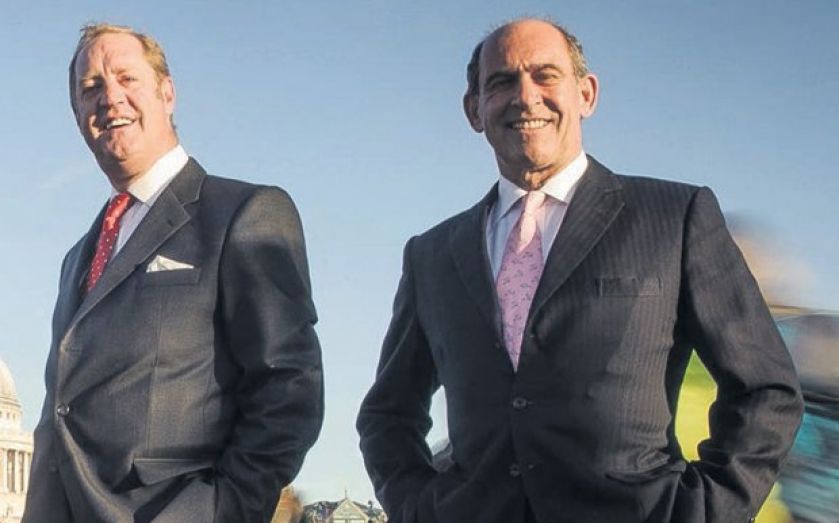The pair taking peer-to-peer to property

Annabel Palmer talks with lending platform founders Anthony Fane and Graham Wellesley
THE BURGEONING peer-to-peer (P2P) lending industry could transform the personal loans market. It is currently worth £550m in the UK, but some experts expect that to increase to as much as £1bn by 2016. One of its newest entrants is Wellesley & Co, a shareholder-backed lending platform, focused on UK real estate and using property assets as collateral. Its P2P entity was launched in November.
The firm, co-founded by Graham Wellesley and Anthony Fane, has been backed by £5m of its four shareholders’ cash. It says investors will earn between 5.5 per cent and 7 per cent a year, depending on the length of their investment. Already, the company has grown a book of loans of £3m since its launch in autumn.
NEW MARKETS
So what encouraged the pair to embrace the P2P phenomenon? Already, it’s a highly-competitive market, with more than 50 platforms now offering P2P loans. And it has been widely-criticised for its potential for abuse. “Since the financial crisis banks have been unwilling to finance small and medium-sized businesses, enabling new entrants to penetrate the market,” Wellesley says. Even in property, he thinks, unless a borrower is looking for a minimum £10m loan, banks won’t engage in discussion.
Whereas some P2P platforms will act as a broker, Wellesley & Co participates in every loan with its own capital. “Other platforms may have a rigorous credit process, but they are not lending their own money. We are, through our shareholders fund. That is pretty unique,” says Fane.
And despite P2P’s rising popularity, the founders are certain of Wellesley & Co’s prospects for success. In its short history, the firm has received 228 loan applications to the value of £122m. Its average loans today are sub-£500,000, but Wellesley believes the real opportunity lies in the loans market up to £6m. “We’re in a catch-22. Up to £6m is highly underserviced. But we want loan diversification, so we’re having to wait for flows of capital,” he says.
MAKING THE TRANSITION
Before joining heads, Wellesley and Fane had lengthy careers in foreign exchange and the City. Wellesley become an entrepreneur in 1995, founding FX platform IFX. “Back then, there were three of us in a big empty room. We all had to be the receptionist, secretary, dealer and director.” Inevitably, however, it has been easier this time around. “It’s a lot less stressful. At IFX, every penny we made was reinvested.” His eldest son has learning difficulties and minor cerebral palsy, and doctors back then weren’t sure if he’d be able to walk or speak. “My family was hugely reliant on me to make this succeed.”
Fane, meanwhile, has found the adjustment from corporate finance adviser to entrepreneur relatively smooth. “I’ve always worked for large organisations, but operating in small, entrepreneurial units. The pressures are different now, of course: it’s your own cash you’re playing with,” he says.
Currently self-financed, Wellsley & Co may seek investment, either loan capital or shareholder equity, once its founders have proven their business model. So what has been their biggest obstacle? “Hiring people with the right skills,” says Fane. “We don’t have backgrounds in property lending. So the success of our business lay with finding a good credit team.”
As a firm operating in the property industry, do they harbour concerns that lenders and borrowers could repeat the mistakes of the past? “If we start to see the availability of 110 per cent mortgages with very low interest rates, we will look at other industries to lend our money. We cannot afford to take on that risk.”
TESTING THE WATERS
Wellesley agrees that access to capital is still “tough” for budding entrepreneurs. “When you’re an employee with a monthly salary, your biggest risk each year is redundancy. But when you’re an entrepreneur, you quickly become aware exactly how much it’s costing each day to, for example, turn the lights on.”
So what advice would they give to budding entrepreneurs? “Don’t give up,” says Fane. Wellesley, meanwhile, thinks entrepreneurs fail because they aren’t honest with themselves about their business model. “If you create a product or service that you think is the elixir of life, and the phone isn’t ringing, then that is only your opinion. You need to look at the reaction to your product, and adjust your business model to accommodate that,” he says.
CV ANTHONY FANE
Company name: Wellesley & Co
Founded: Autumn 2013
Job title: Joint chief executive
Age: 57
Born: London
Lives: South Kensington and Megeve
Studied: Geology at Durham University
Drinking: Red wine
Reading: Horrid Henry books to my son
Favourite business book: The RMA Sandhurst Manual of Leadership
Motto: Failure is success deferred
First ambition: To play guitar in a rock band
Heroes: My father, who was awarded a Military Cross aged 19
Talents: Skiing, tennis, writing
CV GRAHAM WELLESLEY
Company turnover: Expected first year: £12m
Job title: Chairman and joint chief executive
Age: 48
Born: San Francisco
Lives: Hertfordshire, Megeve and Majorca
Studied: Economics at Universita della Svizzera italiana, Switzerland
Drinking: Red wine
Currently reading: Long Walk of Freedom, by Nelson Mandela
Favourite business book: The Art of War, by Sun Tzu
First ambition: To be selected for the British junior cross-country horse-riding team
Talents: Creating startup businesses (this is my fifth)